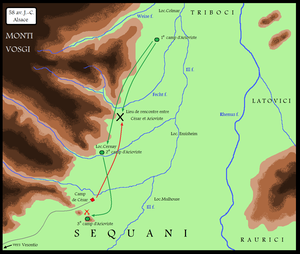Battle of Alsace
| date | 58 BC Chr. |
|---|---|
| place | Alsace |
| output | Victory of the Romans |
| Parties to the conflict | |
|---|---|
|
Suebi , Haruder , Marcomanni , Vangionen , Nemeter , Sedusier , Triboker |
|
| Commander | |
| Troop strength | |
| 30,000 men | 6 legions (approx. 24,000 men) |
The battle in Alsace was a battle in 58 BC. Chr. Between Roman troops led by Julius Caesar and probably some mainly Germanic tribes under the leadership of Ariovistus , king of the Suevi had united. It was the decisive battle in the second conflict in the Gallic War (after the Helvetian War ), which ended with a victory for Caesar. The battle is described in the first book of Caesars De Bello Gallico , where he lists the Haruder , Marcomanni , Vangionen , Nemeter , Sedusier and Triboker as opponents in addition to the Suebi .
prehistory
According to Caesar's account, the reason for the dispute was a petition by the Gallic tribe of the Haedu , which is under the protectorate of Rome, to the general and governor of Gaul , Gaius Julius Caesar. The Gauls suffered from the attacks of Ariovistus after he and his allies, the Sequani , founded the Haedu in 72 BC. At Magetobriga (or Admagetorbiga). In principle, the governor was authorized to intervene if the province or an ally was threatened. In the case of Ariovistus, however, this was problematic, since he died in 59 BC. B.C. had received the title "amicus populi romani" , for which Caesar had campaigned as consul at the time. From a sacred and constitutional point of view, it was forbidden to attack an amicus , unless it was first guilty of a breach of contract.
Caesar introduced the Germans in 58 BC. An ultimatum: Ariovistus should not bring any more troops across the Rhine, release all Haedu hostages and no more attacks on Gallic tribes, otherwise he would have to send his legions. Ariovist's answer was: “If Caesar desires, he may fight. Then he will see what kind of heroes the invincible Teutons are. “So Caesar let his legions march into Alsace, which was occupied by Ariovistus. The two generals met and negotiated on a hill near today's Colmar . In this speech duel, which is described in detail in Caesar's De Bello Gallico , the Germanic king suggested to Caesar that he should not attack and occupy the land of the Teutons. In return, he would "wage any war for you (Caesar) without you having to expose yourself to the chaos of war and any danger ..." .
The battle
Caesar refused and so the battle broke out. 30,000 Germanic warriors pounced on Caesar's six legions (approx. 24,000 men). At the beginning the Teutons were able to press the Romans strongly, some maniples had already been severely decimated, but the officer of the cavalry, Publius Licinius Crassus , decided spontaneously and contrary to Caesar's direct order to reinforce the breaking left Roman wing through his associations; this allowed some maniples and the cavalry to bypass and enclose this flank. More Centuries bypassed the enemy and fell in the rear of the enemy. Panic spread in the retreating ranks of the Teutons, the battle was lost for the Teutons.
consequences
The Germanic peoples withdrew across the Rhine with supposedly enormous losses. Ariovistus also escaped in a boat, but news of his defeat spread quickly and his alliance of Suebi, Marcomanni, Nemeter and Wangionen split up on the other side of the Rhine. The king of the Suebi died four years after the battle.
Caesar left the Triboker , Vangionen , Nemeter and Sedusier tribes who had come with Ariovistus in their new seats on the condition that they would defend the Rhine border against everyone.
Individual evidence
- ↑ Caesar, De bello Gallico 1, 51-54 .
- ^ Caesar, De Bello Gallico 1, 36 .
- ^ Caesar, De Bello Gallico 1, 42-47 .
literature
- Duncan Norton-Taylor: The Celts . Time-Life, New York 1974.
- German edition: The early days of man, Vol. 3: The Celts . Time-Life International, Amsterdam 1974, ISBN 9-06-182-057-X .
